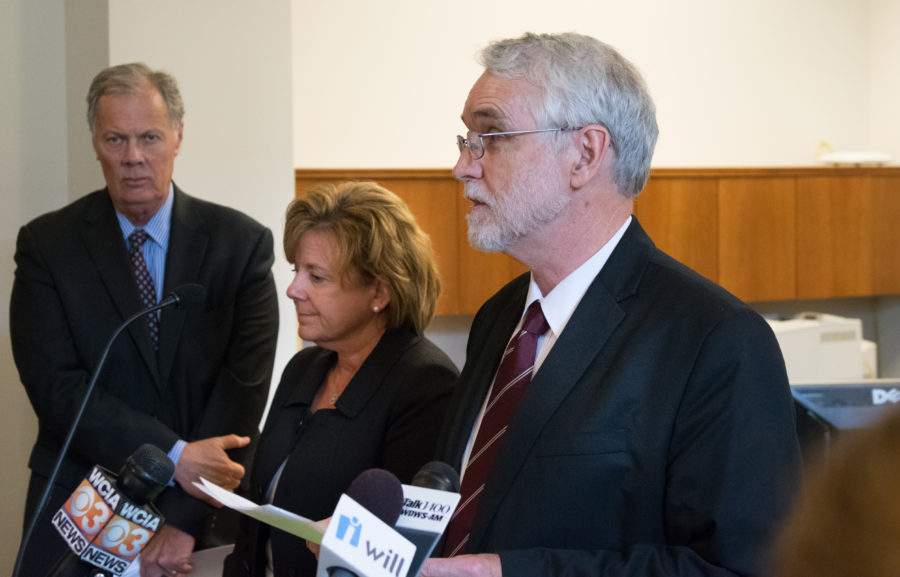UI supports those affected by immigration ban
President Timothy Killeen speaks to media, alongside Acting Chancellor Barbara Wilson (left) the pair released a statement in support of students and faculty affected by the immigration ban.
Jan 30, 2017
Last updated on May 8, 2017 at 04:29 p.m.
President Timothy Killeen, Executive Vice President Barbara Wilson and chancellors from the University of Illinois’ three campuses issued a joint statement condemning President Trump’s executive order temporarily banning entry from Iran, Iraq, Libya, Somalia, Sudan, Syria and Yemen.
They expressed concern for students, faculty and staff from the seven affected countries. They advised against travel outside the U.S. as implementation of the ban is finalized, since it is unclear whether visa holders or green card holders would be allowed to reenter.
In a phone interview Monday, Killeen dubbed the executive order as a threat to the core mission of higher education, which he said champions inclusion, diversity, global engagement and more.
“We think that this new policy is already causing disruption and hardship, and a loss of the ability to travel, speak and interact in the global scholarly community is definitely a detriment to American higher education,” Killeen said.
Get The Daily Illini in your inbox!
American Association of Universities President Mary Sue Coleman released a statement urging the president to reverse the policy. The University is one of 62 leading universities in the organization.
Killeen said the University will work with other institutions and organizations to urge a reversal of the executive order. He plans to contact Illinois’ congresspeople to pressure them directly.
In the meantime, the University will try to emphasize support for its 143 students from the seven countries included in the ban. But it may not be easy, as students have expressed fears.
“The whole thing has been a little disruptive for all of us because we care deeply about our international community,” said Wilson, the system executive vice president. “And it’s been challenging to understand this order and reassure our community.”
The Massmail included contact information to resources for affected students. Killeen said a portal has been created to answer any questions University students have about the executive order.
The immigration ban is scheduled to last for 90 days. The University is honoring its admittance offers to students from the seven affected countries and will explore its legal options if the executive order is extended.
Wilson and Killeen expressed uncertainty for the future. For now, they insisted they will try and support students, faculty and staff who are affected.
“We are going to support the people we admit and work hard to get them here,” Wilson said. “So we aren’t sure what this executive order means in terms of implementation, I don’t think anyone is sure about that, so we’re watching, we’re monitoring events and we will advocate for the students we admit.”
Chancellor Robert Jones sent a Massmail to University students later in the day to “amplify this concern and restate the principles that will guide us at this unsettled and unsettling the time.” He asked the community to stand with the University and support those affected by the ban.
Jones announced the creation of the Administrative Working Group on Immigration, which will include members from offices around campus to stay updated with policy changes affecting the international student population, according to an email Jones sent to staff Sunday. Vice Provost Abbas Benmamoun will chair the group.
Robin Kaler, associate chancellor and University spokesperson, is the contact for cases where University students, faculty, staff and other members of the community are detained or experienced difficulties related to the executive order. She can be reached at 217-333-5010 or at [email protected].
Killeen, Jones and Wilson expressed uncertainty for the future. For now, they insisted they will try and support students, faculty and staff who are affected.






